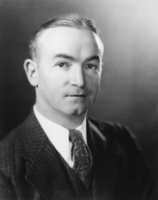 | Back to e-WV
| Back to e-WV
 The West Virginia Encyclopedia
The West Virginia Encyclopedia
 | Back to e-WV
| Back to e-WV
 The West Virginia Encyclopedia
The West Virginia Encyclopedia

Homer Adams Holt (March 1, 1898-January 16, 1976) became West Virginia’s 20th governor on January 18, 1937. After defeating his Republican opponent by a vote of 492,333 to 383,503, he was the first governor sworn into office after the beginning of the term was changed from March to January.
Holt was born in Lewisburg. He attended the forerunner of the Greenbrier Military Academy and Washington and Lee University; he graduated from W&L in 1918 after serving as president of the student body. The 20-year-old mathematics major soon enlisted in the U.S. Army, where he served as second lieutenant but did not go overseas during World War I. After his discharge in May 1919 and a stint working in a Greenbrier County lumber mill, Holt returned to W&L as an instructor in the math department and a student in the law school. He received his law degree in 1923.
The young lawyer, by this time dubbed ‘‘Rocky,’’ married Isabel Wood of Charlottesville, Virginia, in 1924, and became the father of three children. He opened a law practice in Fayetteville, becoming an expert trial attorney and also Fayette County Democratic chairman as well as an active participant in civic affairs.
In the pivotal election of 1932, when Republicans lost their long-standing domination of West Virginia, Holt was elected state attorney general at age 34. He worked with Governor Herman Kump to shore up the state’s ruinous finances following the stock market crash of 1929. It was Holt who argued many of the Supreme Court cases arising from the Tax Limitation Amendment. The amendment, added to the state constitution in the election of 1932, precipitated an immediate and disastrous shortfall in general revenue for state and local governments by setting limits on property levies.
Holt followed Kump into the governor’s mansion with his thumping victory over Judge Summers H. Sharp in November 1936. As governor he took a conservative approach, paying only marginal allegiance to the New Deal policies of President Franklin D. Roosevelt. From the beginning of his term, Holt made financial stability a mainstay of his administration, and he supported continuation of the consumer sales tax to offset restrictions on state revenues imposed by the Tax Limitation Amendment.
Holt was firmly mistrustful of labor union leadership. When 2,500 miners walked off the job in Fayette, Raleigh, Mercer, and McDowell counties during 1939, he sent them a letter promising the support of his office if they returned to work without a union contract. State union officials became so irate that they turned to U.S. Sen. Matthew Mansfield Neely as their choice for governor in the next election, in opposition to Holt’s candidate, R. Carl Andrews. Akin to his position on coal strikes was Holt’s philosophical stance on the New Deal policies of the national Democratic Party. He aligned himself with the ‘‘statehouse faction’’ among West Virginia Democrats, as opposed to a liberal New Deal element in the party headed by Neely and several union leaders.
While Governor Holt labored to maintain the state’s financial integrity, he disagreed with education leaders that special legislation was needed to raise additional funds for the public schools. Yet he supported a move to provide free textbooks for students. In 1938 he was an ardent supporter of the Short Ballot Amendment to the state constitution. The amendment, which called for election of only three statewide offices (governor, attorney general, and auditor, with the others being appointed by the governor) was rejected by the voters in 1938.
When M. M. Neely won the Democratic nomination for governor in 1940, while still serving in the U.S. Senate, Democratic factionalism again expressed itself in the fray over the appointment of a replacement for Neely in Washington. As outgoing governor, Holt appointed attorney Clarence E. Martin of Martinsburg, while Neely as incoming governor appointed Joseph Rosier, president of Fairmont State College (now Fairmont University). The governor makes such appointments, so the issue hinged on the exact moment Neely ceased being senator and became governor. The split between conservative and liberal Democrats in West Virginia widened further when the U.S. Senate finally seated Rosier after a lengthy deliberation. Fifteen years later, Holt bolted the party and supported a young Republican named Cecil H. Underwood in his 1956 race for the governorship.
Holt practiced law in Charleston upon leaving office in 1941 until 1947, when he became general counsel for the Union Carbide company in New York City. After becoming vice president and a director of the chemical giant he returned to private practice in Charleston until his death. He is buried in Rosewood Cemetery, Lewisburg.
Written by Paul D. Casdorph
Morgan, John G. West Virginia Governors, 1863-1980. Charleston: Charleston Newspapers, 1980.
Rice, Otis K. West Virginia: A History. Lexington: University Press of Kentucky, 1985.
Charleston Gazette, 1/17/1976.